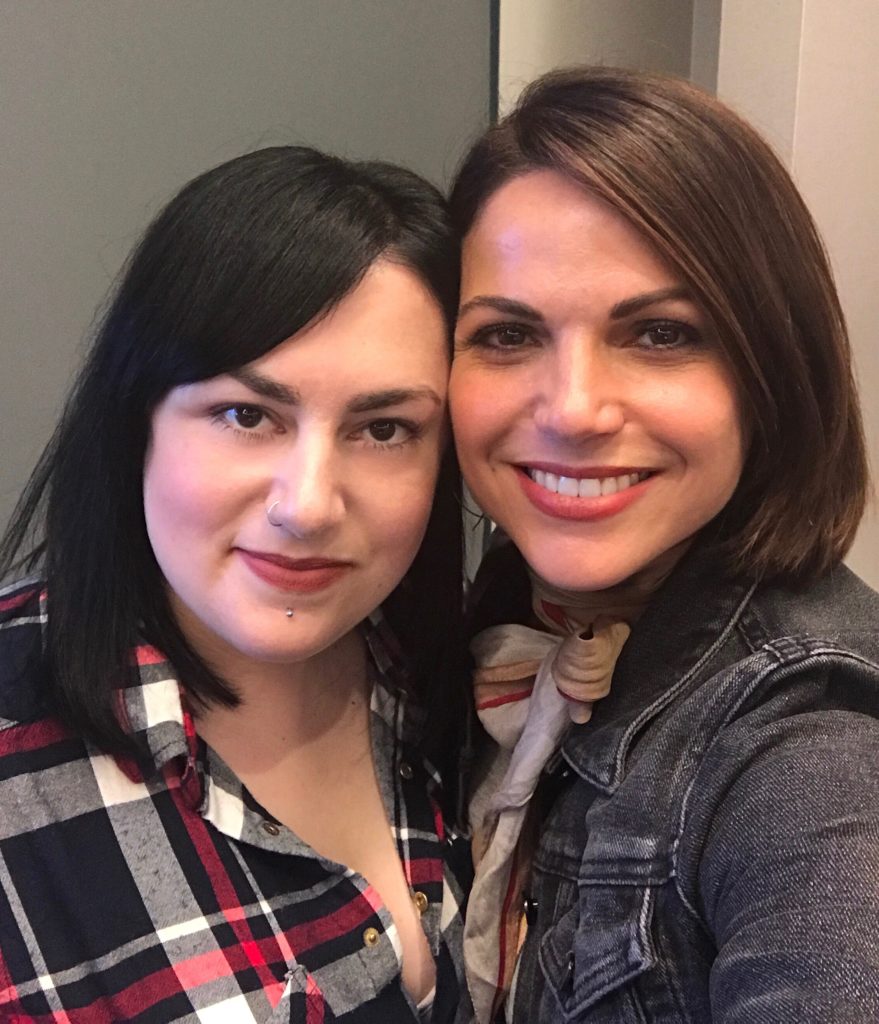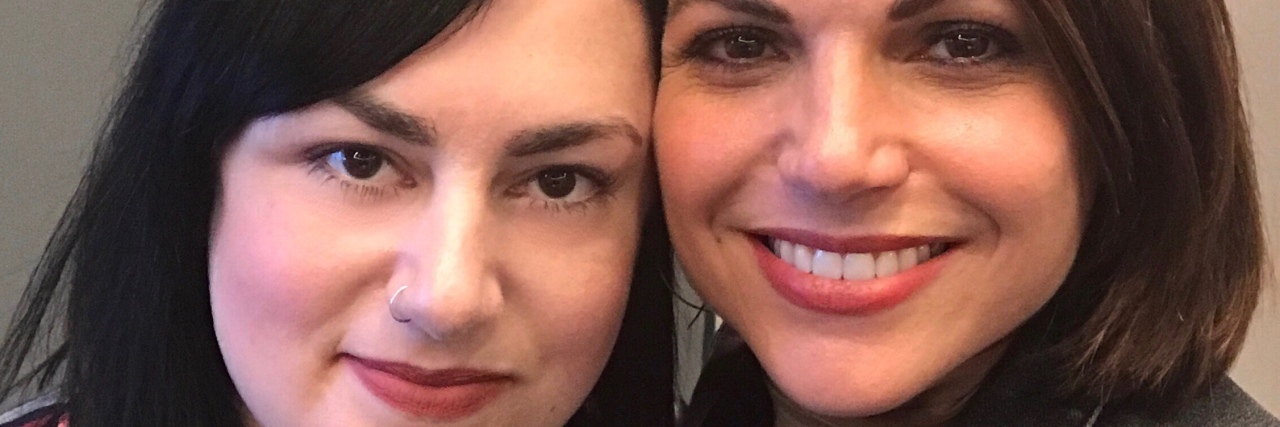What This ‘Evil Queen’ Taught Me About Living With Borderline Personality Disorder
Editor's Note
If you’ve experienced sexual abuse or assault, the following post could be potentially triggering. You can contact The National Sexual Assault Telephone Hotline at 1-800-656-4673.
If you struggle with emotional abuse, self-harm or experience suicidal thoughts, the following post could be potentially triggering. You can contact the Crisis Text Line by texting “START” to 741741. For a list of ways to cope with self-harm urges, visit this resource.
It’s not uncommon for people to feel connected to fictional characters they see aspects of themselves in. It’s also not uncommon to recognize traits in the characters we love that we’d like to embody. Whether art imitates life or life imitates art, it is always possible for us to learn from characters and experience personal growth as a result.
The character who has taught me the most valuable lessons about life and living with borderline personality disorder (BPD) is undoubtedly Regina Mills from “Once Upon a Time,” also known as the Evil Queen (played by the immensely talented Lana Parrilla). I know some would consider it controversial to relate mental health lessons to someone usually labeled as a villain, but hear me out.
In the “Once Upon a Time” (OUAT) mythology, Regina Mills’ story began in the Enchanted Forest. There, she experienced ongoing physical, mental and emotional abuse at the hands of her mother, who killed her true love in front of her, then married her off to a 60-something-year-old king (at the age of 18). After this series of events, Regina’s adult life took a dark turn. Yes, she was responsible for chaos and death, as were most of OUAT’s heroes, such as Snow White. The archaic culture of the Enchanted Forest dictated a medieval response to life and death by modern comparison, but that’s an entire topic on its own.
Long story short, Regina reached the conclusion she would never be loved or accepted if people were given the choice (nor would she be able to exact adequate revenge on those who had hurt her), so she cursed her realm to live in the modern world we all know, without their memories. Over 28 years, as time stood still, Regina’s loneliness grew and she eventually adopted a son, whom she came to love deeply. Though her curse was eventually broken and her son rejected her for some time, Regina began a long, arduous journey of redemption and grew into an admirably strong and kind individual.
In my eyes, Regina is both a positive and realistic embodiment (fairy tale content aside) of what it’s like to survive trauma and navigate the often stormy waters of borderline personality disorder. She greatly struggled to see herself as worthy of love in any capacity and made frequent desperate attempts to avoid abandonment and rejection (particularly with her son); she experienced feelings on a huge scale, whether sad, angry or loving, and often failed to control her emotional reactions; she behaved impulsively and destructively, particularly when belittled or rejected; her relationships were unstable; she expressed feelings of emptiness, as well as paranoia about others; and her sense of self was murky at best for several decades. Yet, Regina eventually found better ways to manage herself and to channel her fierce, fluctuating emotions.
These are just some of the lessons I’ve learned from her over the years:
1. It’s never too late to initiate change.
Sometimes BPD can feel like an insurmountable challenge that will never get easier. With a good support team and therapies like dialectical behavior therapy (DBT), though, it’s possible to improve symptoms over time. Such was Regina’s journey to the extent where she eventually became beloved by her entire community, as well as herself. We are capable of unlearning destructive habits and learning new ones that initiate growth. This has been a valuable lesson for me in terms of trying to shift my emotional reactions and reliance on self-harm as a coping mechanism.
2. Vulnerability and love are not weaknesses.
Regina’s mother taught her from a young age that love is weakness. She was told to value power and to never appear vulnerable. Over the years, she learned love is actually strength and the bonds we form with others can be enriching and empowering. She learned that letting her walls down and actually talking to people about how she feels could be validating and help her to move forward.
Like Regina, I have learned this through trial and error. Vulnerability can be both counterintuitive and enticing to people with BPD. In the past, I’ve met people in social settings and blurted out personal stories, yet I’ve also struggled greatly to be vulnerable with loved ones. I spend a lot of time feeling like a raw nerve and indulging in open, vulnerable conversation with people often leaves me feeling exposed and overly sensitive. Despite this, I’ve learned that communicating honestly with those close to me actually strengthens bonds. It usually establishes a sense of safety for them to do the same with me, which then enables me to empathize with them.
3. What others think of you does not dictate who you actually are.
Regina was constantly put into a box of negative labels her peers continued to push on her, even when she was well into her recovery. Over time, she learned to turn away from insults and focus on simply living her life. Regina eventually realized she was the only one who got to choose her path, and that certain behaviors and mistakes she made did not define her as a person.
This is something I’m learning and relearning every day. It can be difficult for people living with BPD — a heavily stigmatized mental illness, even in the professional field. Some psychologists won’t even work with clients diagnosed with BPD. Despite being referred to as a personality disorder, it does not define me or anyone else living with it. Only we get to decide who we want to be.
4. Forgiveness will ultimately set you free.
A significant contributor to Regina’s reign as the Evil Queen was her ongoing battle with forgiveness — of both others and herself. Holding on to the wrongdoings inflicted on her and by her only fueled her anger. Regina was eventually able to forgive her mother and many others; she even found a way to forgive herself. I know this is easier said than done — at times we may even think we’ve let grudges go, only for them to re-emerge later.
It’s also extremely difficult to forgive perpetrators of abuse; I grappled for years to forgive those who abused me as a child and the stranger who attacked me as a teenager. Eventually, I came to understand that doing so was not about them at all — it was about me letting go of deep-rooted anger that was toxic to me. I meditated on this for a long time after seeing Regina get closure with her mother and eventually managed to get to a place where I was able to embrace forgiveness. It took years, but that’s OK. None of us are on a schedule with this and however long it takes is alright.
5. There will be slip-ups on the road to recovery and that’s OK.
Regina had several slip-ups during her recovery, but she always picked herself up again (and sometimes allowed the people around her to pick her up too). She kept moving forward and doing the best she could. After her first slip-up, I remember crying throughout the episode because I had just slipped up with self-harm for the first time in a while. I was overwhelmed with shame and disappointment in myself. I really believed that one relapse somehow negated all of the days prior I had been clean.
What I learned from Regina’s journey is that a relapse does not cancel out all the achievements that came before it, or the ones that come after. Relapse is part of recovery and it’s human. What matters is getting back up, being gentle with yourself, and moving forward.
6. You are still capable of loving and being loved — and you’re worthy of that.
One of Regina’s most beautiful qualities is that despite the trauma and loss she endured, despite the hurt she caused herself, she was still capable of loving deeply and receiving love. This was first evident with her son and then gradually her peers. For a long time, Regina appeared shocked and emotional every time her son said something kind to her or hugged her; it was evident she didn’t see herself as worthy or lovable for some time. This slowly changed, as Regina continued to demonstrate support for those around her.
This is something I’ve battled with for decades and my progress with it fluctuates. At times, I believe I’m unworthy of love and acceptance, and at other times I can see I am. At times, I think I’m terrible at loving people the way they deserve to be loved and at other times I’m overwhelmed with love for the people in my life. I know many people have trouble believing in themselves when it comes to love and belonging, but you do deserve it and you are capable of it. I like to think the ability to emote so strongly, in general, demonstrates a significant capacity for love.
7. You don’t need a partner to be complete or to live a full life.
Spoiler alert, but Regina finishes out the series being one of the few lead characters not paired off with a love interest. And honestly, that was a gift to many, as it signified the validity of a full life not being contingent on having a spouse. As a woman in her 30s with a deep desire for love, it isn’t always easy to see the people in my age bracket married off and having babies. Women, in particular, are still somehow defined by society as successful when they have a family. It was really eye-opening for me to see Regina living her best life, flying solo and enjoying it. This empowered me to re-evaluate everything I had heard about gender roles in adulthood. It also helped me to reframe my own story and consider the many blessings that come with being single.

These are just a few valuable life lessons I’ve learned from my favorite character. If you find inspiration and self-growth through a character, know it’s valid and positive to do so. There will always be people who don’t understand the fascination with fictional beings — don’t let those people rain on your parade. Only you really know what those characters mean to you and why.
Image via contributor.

